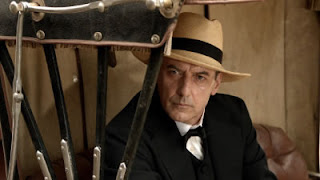Katinka Heyns’s first film in well over a decade, Die Wonderwerker (The Miracle Worker), is an engaging character drama built around a specific period in the life of South African poet and naturalist Eugene Marais (1871-1936), played here by Dawid Minnaar in one of the best performances of his career. Die Wonderwerker also provides Eliza Cawood with some powerful scenes where she mostly underplays much of the character Maria’s anxieties, and while many have complained about Anneke Weideman’s Jane, I have to admit that I was neither blown away nor offended by her performance. The way some people talk about her you’d swear the character is expected to be an essayist whose tour de force on Darwin got published at puberty instead of the immature 19-year old farm girl the film gives us.
En route to Nylstroom, Marais arrives on the Van Rooyen farm with malaria and the family take him in to see to his recovery. Marais’s presence intensifies tensions that are already present: Maria and her husband Gys (Marius Weyers) have not seen eye to eye for a while, and their son Adriaan (Kaz McFadden) has an unhealthy interest in young Jane Brayshaw, the Van Rooyens' adopted daughter. As these characters turn to each other Marais turns mostly to himself – he is addicted to morphine – until he starts to see Jane as possibly more than just a young girl.
Koos Roets, recipient of a lifetime achievement award at this year’s Cape Winelands Film Festival, remains a consummate cinematographer; Die Wonderwerker looks great, with a deeper colour depth than many other Afrikaans films. And how refreshing to see an Afrikaans film that does not feature that annoying sped-up day-to-darkness shots to indicate the passage of time.
I have major issues with Heyns’s previous work, and this film isn’t flawless, but it’s as if all of her films have lead to this moment: while the earlier films tick most of the features of old fashioned classical filmmaking, Die Wonderwerker is superb classical filmmaking. This film is far more successful at mastering this approach to storytelling than Roepman. Between all the formulaic storytelling and moments of indulgent exposition, Heyns delivers a memorable portrait of Marais constructed around her favourite theme: the outsider who brings turmoil and change into the Afrikaans nuclear family.
It’s a very specific portrait of Marais, and listening to people’s responses to the character construction I was reminded of Roger Ebert’s lukewarm review of Iris¸ the biopic of Iris Murdoch that I quite liked. To paraphrase Ebert: Iris is a wonderful film, but it’s not about the Iris he knew and loved. I suspect the same applies to Die Wonderwerker: it’s a depiction of Marais that may not positively correspond with how many see and appreciate the historical figure. Nonetheless, even those unmoved by the film’s version of Marais should recognise that between some over manipulative moments, Die Wonderwerker has greater emotional resonance than any of Heyns’s previous films.It is one of the best Afrikaans language films of the past few years.
En route to Nylstroom, Marais arrives on the Van Rooyen farm with malaria and the family take him in to see to his recovery. Marais’s presence intensifies tensions that are already present: Maria and her husband Gys (Marius Weyers) have not seen eye to eye for a while, and their son Adriaan (Kaz McFadden) has an unhealthy interest in young Jane Brayshaw, the Van Rooyens' adopted daughter. As these characters turn to each other Marais turns mostly to himself – he is addicted to morphine – until he starts to see Jane as possibly more than just a young girl.
Koos Roets, recipient of a lifetime achievement award at this year’s Cape Winelands Film Festival, remains a consummate cinematographer; Die Wonderwerker looks great, with a deeper colour depth than many other Afrikaans films. And how refreshing to see an Afrikaans film that does not feature that annoying sped-up day-to-darkness shots to indicate the passage of time.
I have major issues with Heyns’s previous work, and this film isn’t flawless, but it’s as if all of her films have lead to this moment: while the earlier films tick most of the features of old fashioned classical filmmaking, Die Wonderwerker is superb classical filmmaking. This film is far more successful at mastering this approach to storytelling than Roepman. Between all the formulaic storytelling and moments of indulgent exposition, Heyns delivers a memorable portrait of Marais constructed around her favourite theme: the outsider who brings turmoil and change into the Afrikaans nuclear family.
It’s a very specific portrait of Marais, and listening to people’s responses to the character construction I was reminded of Roger Ebert’s lukewarm review of Iris¸ the biopic of Iris Murdoch that I quite liked. To paraphrase Ebert: Iris is a wonderful film, but it’s not about the Iris he knew and loved. I suspect the same applies to Die Wonderwerker: it’s a depiction of Marais that may not positively correspond with how many see and appreciate the historical figure. Nonetheless, even those unmoved by the film’s version of Marais should recognise that between some over manipulative moments, Die Wonderwerker has greater emotional resonance than any of Heyns’s previous films.It is one of the best Afrikaans language films of the past few years.

No comments:
Post a Comment